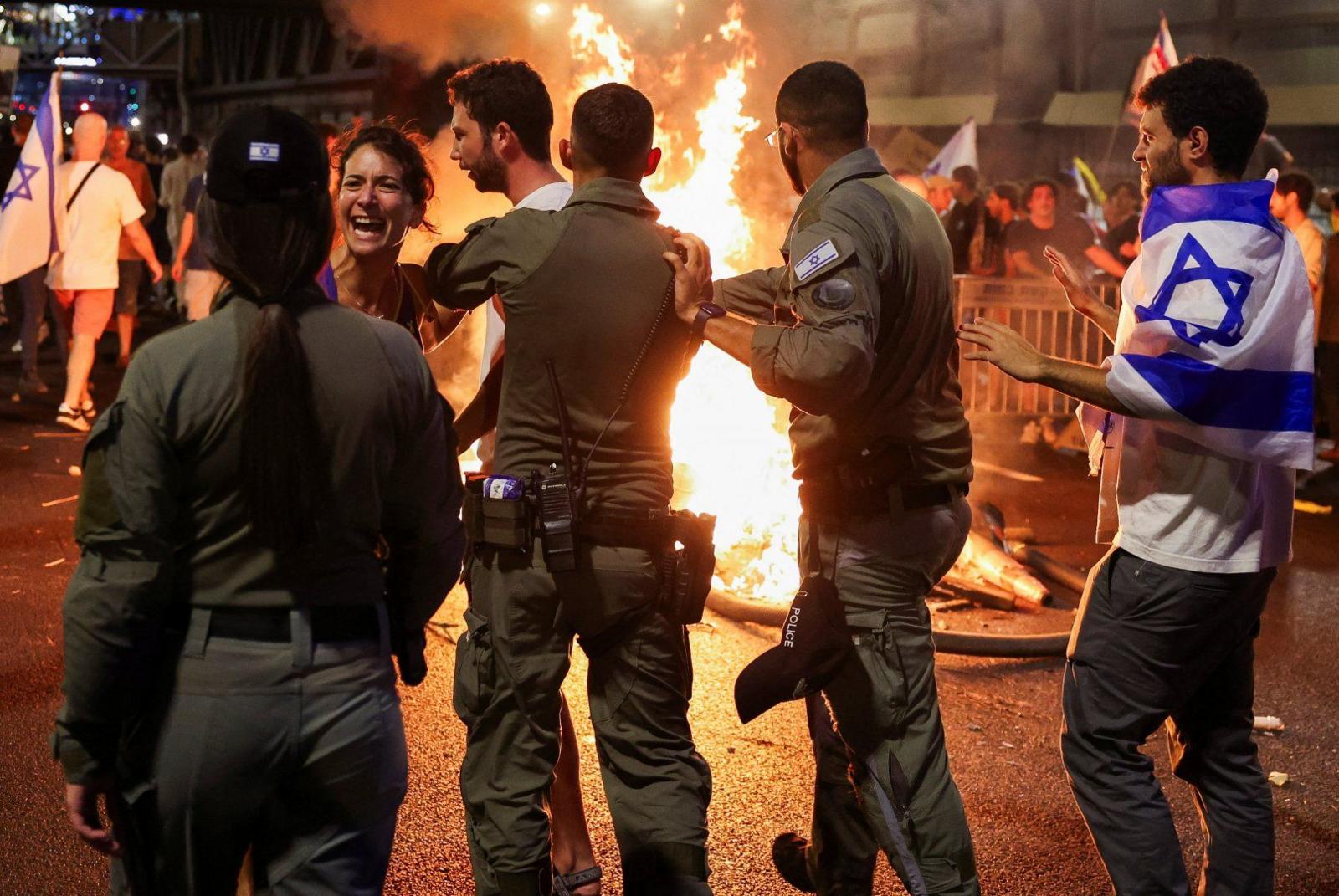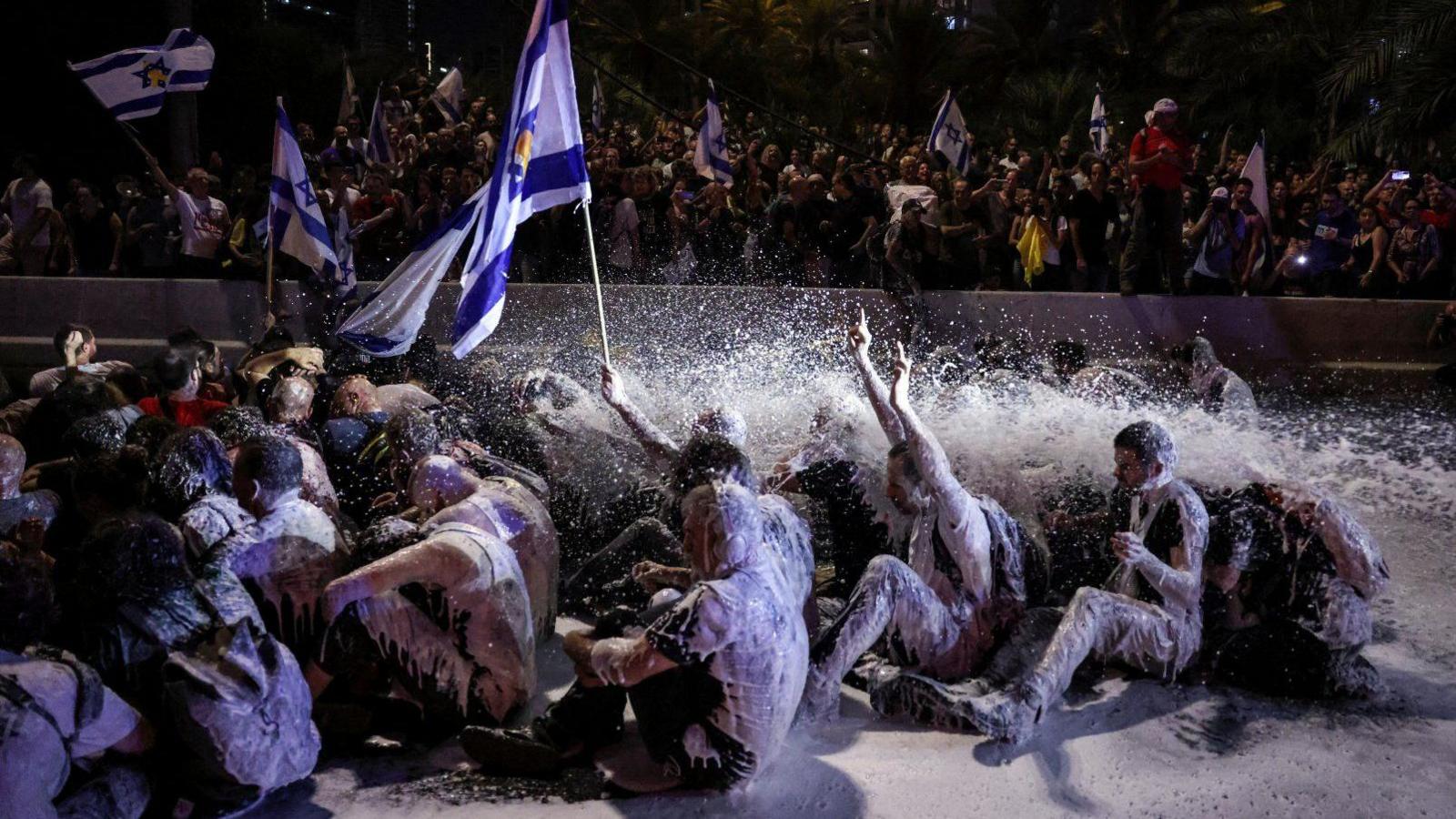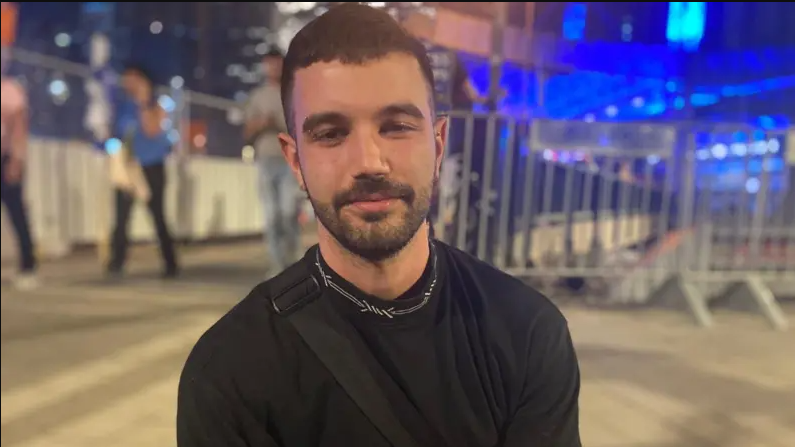Tens of thousands rally in Israel calling for hostage release deal
Thousands protest in Tel Aviv after hostage bodies recovered
- Published
Tens of thousands of people have rallied across Israel after the bodies of six hostages held by Hamas in the Gaza Strip were recovered by soldiers, causing national outrage.
Protesters - many clad in Israeli flags - descended on Tel Aviv, Jerusalem and other cities, accusing PM Benjamin Netanyahu and his government of not doing enough to reach a deal to secure the release of the remaining hostages taken by Hamas during the 7 October attacks.
Sunday's protests were largely peaceful - but crowds broke through police lines, blocking a major highway in Tel Aviv.
This comes as a major Israeli labour union, Histadrut, called for a nationwide general strike on Monday, pressing for a hostage deal.

There was a tense stand-off in Tel Aviv amid burning barricades on the streets

Police used water cannon to try to disperse the crowds in Tel Aviv
The Israel Defense Forces (IDF) said earlier that the six bodies were found on Saturday in an underground tunnel in the Rafah area of southern Gaza.
The hostages were identified as Carmel Gat, Eden Yerushalmi, Hersh Goldberg-Polin, Alexander Lobanov, Almog Sarusi and Master Sgt Ori Danino.
The IDF said they had been killed shortly before its troops reached them on Saturday.
This triggered Sunday's protests, with crowds accusing the government and Mr Netanyahu personally of failing to save the remaining hostages.
In Tel Aviv, protesters broke through police lines on to Ayalon Highway late on Sunday.
Some people scaled buses and bins to gain a vantage point over the march, while others surrounded someone wearing a mask of Mr Netanyahu, chanting: “Alive, alive, we want them alive.”
One demonstrator held a sign which read: "You are the head. You are to blame".
Crowds also chanted slogans including "policemen, policemen who are you protecting" and "shame, shame".
Some set fires on the road and draped yellow ribbons - a symbol of solidarity with the hostages.
Naama Lazimi, a Labor Party lawmaker, told the BBC she was lightly injured after police let off stun grenades and she fell down.
She described the protests as “significant and important”. but said the “question is what happens tomorrow”.
Among the protesters was Eli Shtivi, whose son Idan is being held hostage in Gaza.
“We hope that those who make the decisions will wake up,” he told the BBC. “We don’t have time any more.”
He said people from all strands of Israeli society took part in Sunday's rallies, united in wanting the hostages returned.
“I miss my child so much. All the families are kind of hostages too,” Mr Shtivi said.
Noga Burkman, another demonstrator in Tel Aviv, told the BBC she "couldn't stay at home any more".
"People understand that now we need to break the rules and do something," she said, adding that "tonight is just the beginning".
Elsewhere, in the city itself, the gathering saw a diverse mix of protesters, with one group of young scouts leading chants.
In Jerusalem, a massive crowd of demonstrators gathered outside the prime minister's office.

Yotam Peer, whose younger brother was killed on 7 October, has joined the demonstration
One 50-year-old man told the BBC that the demonstrations were far bigger than any previous ones. "It’s a totally different game today," he said. "A different scale to anything before."
Among those present at the protests in Tel Aviv was 24-year-old Yotam Peer, whose 21-year-old brother was killed on 7 October in the Hamas attacks. He told the BBC: "After we heard about the six hostages, we couldn’t be silent any more. It’s really important. We don’t have a choice any more."
Local media reported that opposition leader Yair Lapid was present. The former prime minister, who leads the Yesh Atid party, earlier backed calls for a mass strike to force Mr Netanyahu into a deal over the release of the hostages.
Calling the general strike, union leader Arnon Bar-David said: "We must reach a deal. A deal is more important than anything else."
He added: "We are getting body bags instead of a deal."
Families of the hostages have been pushing for a nationwide strike as part of efforts to get a ceasefire agreement between Mr Netanyahu's government and Hamas for weeks.
The Hostages Families Forum said that the six captives, whose bodies were recovered by Israeli military, were "murdered in the last few days, after surviving almost 11 months of abuse, torture and starvation in Hamas captivity".
"The delay in signing the deal has led to their deaths and those of many other hostages," it said.
The prime minister said he was committed to securing a deal that releases the remaining captives and protects the country's security. But he said: "Whoever murders hostages does not want a deal."
The far-right Finance Minister Bezalel Smotrich was quick to condemn the general strike, claiming that it represented "the interests of Hamas".
But others have come forward in support. Tel Aviv's Mayor Ron Huldai announced that the city's municipal workers were free to join Monday's strike "as a sign of solidarity with the abductees and their families".
Israel recovers bodies of six Gaza hostages
- Published1 September 2024
Israeli West Bank raid leaves destruction and determination in its wake
- Published30 August 2024
It is not clear how many hostages remain in Gaza. Hamas kidnapped 251 people and killed 1,200 others during an attack in southern Israel on 7 October 2023.
Israel launched a retaliatory military campaign against Hamas in Gaza. More than 40,530 people have been killed there since 7 October, according to the territory's Hamas-run health ministry.